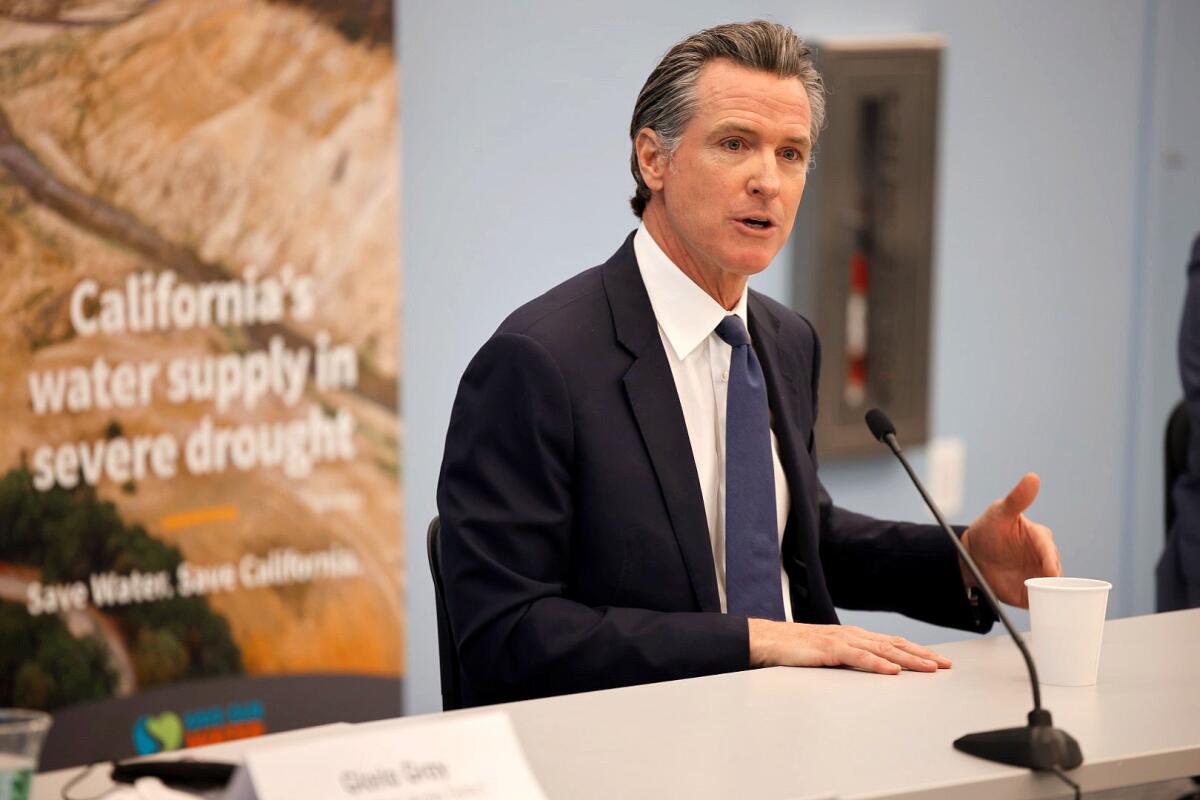Amid fight with oil industry, Newsom makes a last-minute pitch to harden California’s climate goals

Gov. Gavin Newsom this week urged California lawmakers to harden the state’s climate and energy goals, releasing a five-point legislative plan that promises to intensify the governor’s clash with the state’s powerful, billion-dollar oil industry.
The proposal calls for lawmakers to enact more aggressive targets on state laws that reduce greenhouse gases and increase the use of renewable energy.
Newsom also called for a new law that would establish health and safety buffer zones around new oil and gas wells, restrictions his administration is trying to adopt though the state’s slow-moving regulatory process.
Anthony York, a spokesman for Newsom, said that with just three weeks left before lawmakers adjourn for the year, the end of the session provides an opportunity for the governor to propel climate legislation through the statehouse.
“The larger point is just the nature of the climate crisis,” York said. “It’s gotten worse. We see it in our wildfires and our drought and the impact on energy supply and impacting our ability to keep the lights on. The governor thinks now is the right time to take bold action.”
Newsom’s push is as much an attempt to rally Democrats at the statehouse to address climate change as it is to hammer big oil companies.
Kevin Slagle, a spokesman for Western States Petroleum Assn., said the outline of the governor’s plan is concerning.
“Climate and energy policy is too important for all of us to be implemented by bans, mandates and these last-minute legislative proposals that are pretty far-reaching,” Slagle said. “What we’ve seen is these will be expensive for California families. It’s going to be devastating for a lot of workers and communities, and it will really affect large parts of our economy.”
Newsom ran ads in Florida last month contrasting the state’s restrictive policies on abortion rights and education with “the freedom of speech, freedom to choose, freedom from hate and the freedom to love” in California. The spots stoked speculation nationally about Newsom’s presidential ambitions and bolstered the governor’s image beyond California as a Democratic leader fighting back against the GOP.
The association of oil companies responded with their own advertisements in Florida warning about the cost of Newsom’s climate policies.
“We pay $1.65 more for a gallon of gas than you do,” the association said in a video ad that ran in the Miami market. “Our electricity rates are twice as high as yours. Gavin Newsom is banning gas cars and shutting down California oil production. California can’t afford Gavin Newsom’s ambition. Can Florida?”
The group repeated much of the same message in a print ad in the Miami Herald.
“We’ve been trying to talk to him about the cost of these programs and the impacts of the bans and mandates,” Slagle said. “Unable to get his attention here in California, we turned to a place where he was focusing himself on: Florida.”
Slagle pushed back on the idea that the $100,000 the association spent on ads backfired in light of the governor’s last-minute call for climate and energy legislation.
York said the battle with the industry group is “part and parcel” of the governor’s effort, but he dismissed the notion that its ads affected his decision to take action.
“The response from these companies that are making multibillion-dollar profits as everyday Californians are hurting is not surprising and not unexpected,” York said.
Newsom made a rare visit to Democratic caucus meetings last week in the state Senate and Assembly, where he spoke about the worsening climate crisis and the need to do more through legislation. When some lawmakers offered a tepid response to his call for a quick three-week turnaround to pass the laws, Newsom warned that history would judge their actions.
Assembly Speaker Anthony Rendon (D-Lakewood) and Senate President Pro Tem Toni Atkins (D-San Diego) said addressing climate change continues to be a top priority of the Legislature and promised to work closely with the governor in the weeks ahead.
“The Assembly appreciates the governor’s strong stance in favor of bold climate actions, especially as it echoes steps the Assembly has taken in recent years,” Rendon said in a statement.
Lauren Sanchez, the governor’s senior climate advisor, said the climate bill approved by the U.S. Senate over the weekend will make it easier for the state to cut emissions, in part by expanding tax credits for Californians to buy or lease rooftop solar panels, electric cars and electric heat pumps.
“We’re feeling very excited about the windfall of funding,” Sanchez said. “California stands to benefit more than most states.”
Newsom has already set in motion many of the tenets of his climate proposal through executive orders or directives to his administration.
The governor is calling for lawmakers to pass bills that reduce greenhouse gasses by 55% below 1990 levels by 2030, which would expand beyond the current goal of 40% over the same time.
The governor wants the Legislature to pass a goal to achieve statewide carbon neutrality no later than 2045, which he outlined last month in a letter to the chair of the California Air Resources Board. Under Senate Bill 100 approved and signed into law by former Gov. Jerry Brown in 2018, California set a goal of reaching 100% renewable electricity sales by 2045. Newsom wants to add interim targets: 90% by 2035 and 95% by 2040.
His pitch includes asking lawmakers to adopt a law establishing a setback distance of 3,200 feet between new oil and gas wells and homes and schools and to enhance pollution controls for existing wells, measures he directed his administration last year to consider through state regulations.
The final point of Newsom’s proposal would direct the Air Resources Board to develop a strategy for removing carbon from the atmosphere that minimizes harm to at-risk neighborhoods — a key priority for environmental justice activists, who worry carbon removal programs will allow fossil fuel plants to keep polluting low-income communities of color.
Newsom has faced pressure from influential environmental groups to ban new oil and gas drilling and phase out fossil fuel extraction in the state since taking office. But the Democratic governor has gone with a more measured approach, taking into consideration the effects on oil workers along with California cities and counties that are economically dependent on the petroleum industry.
Kassie Siegel, director of the Center for Biological Diversity’s Climate Law Institute, said accelerating the 2030 emissions reduction goal and protecting communities from oil drilling are essential.
“It’s good for the state,” Siegel said. “It’s good for the Legislature. It’s good for the governor. It’s good for everybody. It’s the right thing to do.”
Oil companies and trade unions representing workers in the industry have successfully defeated similar attempts by progressive lawmakers to advance the state’s climate agenda.
A bill from Assemblyman Al Muratsuchi (D-Rolling Hills Estates) to establish the oil well buffer zones died in a state Senate committee in 2020.
Sen. Henry Stern’s SB 582, which in its strongest form would have required the state to reduce greenhouse gasses to 80% below 1990 levels by 2030 and set a goal to achieve net negative emissions by 2035, died in the Senate two years in a row.
Newsom remained on the sidelines while environmental advocates in the Legislature battled it out with the oil industry and unions.
Some legislators have quietly questioned why the governor is joining the fight now as he’s branding himself as a climate leader on the national stage and publicly battling with the oil industry. Others say the reasons don’t matter.
“We wouldn’t even be entertaining serious climate action if the governor hadn’t initiated here,” Stern (D-Los Angeles) said. “A lot of the key pieces in the governor’s proposal here have failed in our house and he’s going to need to lean in if we’re going to change that now.”
York said “the governor is all in.”
“He’s going to be out front,” York said. “This is his agenda that he wants to get through the Legislature in the next couple of weeks.”
Times staff writer Sammy Roth contributed to this report.
More to Read
Sign up for Essential California
The most important California stories and recommendations in your inbox every morning.
You may occasionally receive promotional content from the Los Angeles Times.











